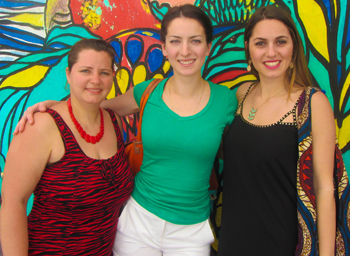 More than 4,300 miles from Baltimore, Polina Iarikova, DDS ’15, learned that interprofessional collaboration is a health care priority that transcends international borders. Working with dentists, nurses infectious disease specialists, social workers, pharmacists and psychologists in Salvador, Brazil, Iarikova saw firsthand how cooperation leads to enhanced patient care.
More than 4,300 miles from Baltimore, Polina Iarikova, DDS ’15, learned that interprofessional collaboration is a health care priority that transcends international borders. Working with dentists, nurses infectious disease specialists, social workers, pharmacists and psychologists in Salvador, Brazil, Iarikova saw firsthand how cooperation leads to enhanced patient care.
She spent two weeks in Brazil’s third largest city, shadowing health care professionals in one of the South American nation’s busiest clinics for patients who have HIV and STDs. She worked with an infectious disease specialist who established follow-up appointments for newly-diagnosed patients and shadowed a child psychologist who counseled children who were born HIV-positive. “I learned a great deal about the scope of expertise that nurses and social workers have,” Iarikova says. “Once you actually see them in action, your perspective is completely different.”
While visiting a rural HIV clinic, Iarikova saw how health care professionals improvise to provide treatment with very limited resources. Patient noncompliance, she learned, is often a result of serious socioeconomic issues. “One patient who came to the clinic said that he couldn’t take his HIV medication because the pills should be taken with food – and he didn’t have any food,” says Iarikova.
Her experience overseas also opened her eyes to the complexities of HIV. The disease is a serious problem in Brazil and impacts people of all different ages, races and socioeconomic backgrounds. “The stereotype that we have in our minds about people who have HIV is very different from reality,” she says.
The disease takes a huge psychological toll on patients. Iarikova recalls one young man who refused to take his HIV medications, despite strong arguments from both his doctor and his mother. Finally, after a heated argument, the patient looked into his mother’s tear-filled eyes and saw all the pain and worry that his noncompliance was causing, Iarikova says. “It was almost like a therapy break through. After that, the patient’s personality completely switched. He stopped putting up his guard,” she says.
That story emphasizes to Iarikova the emotional qualities that are central to health care decisions. It’s an important lesson she intends to carry with her as she launches her dental career.
Caption: Polina Iarikova, DDS '15 (center) is pictured with Ozlem Yazar, a student at the University of Maryland School of Social Work (left) and Neda Mirjafary, a student at the University of Maryland School of Nursing.



